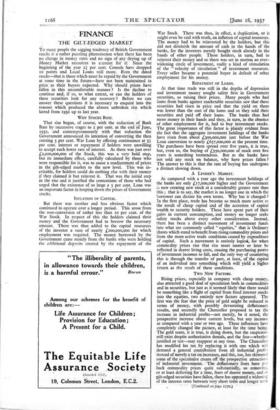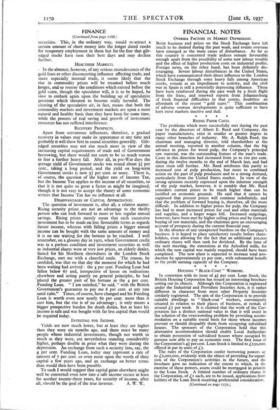THE GILT-EDGED MARKET
FINANCE
To many people the sagging tendency of British Government stocks is a rather puzzling phenomenon when there has been no change in money rates and no sign of any drying up of Money Market resources to account for it Since the beginning of the year 2k per cent. Consols have dropped ro points and Local Loans still more. Even the dated stocks—that is those which must be repaid by the Government at some time in the future—have not been maintained in price as their buyers expected. Why should prices have fallen in this uncomfortable manner ? Is the decline to continue and, if so, to what extent, or can the holders of these securities look for any recovery ? Before we can answer these questions it is necessary to enquire into the reasons which produced the almost unbroken rise which lasted from 1932 up to last year.
WHY STOCKS ROSE.
That rise began, of course, with the reduction of Bank Rate by successive stages to 2 per cent. at the end of June, 1932, and contemporaneously with that reduction the Government announced its intention of converting the then existing 5 per cent. War Loan by offering continuance at 3.1 per cent. interest or repayment if holders were unwilling to accept such lower rate of interest. As there was just over £2,000,000,000 of the Stock, this was a very bold step, but its immediate effect, carefully calculated by those who were responsible for it, was to cause a readjustment of prices in the gilt-edged market to the new level. This was in- evitable, for holders could do nothing else with their money if they claimed it but reinvest it. That was the initial step in the rise and it justified the contentions of those who had urged that the existence of so large a 5 per cent. Loan was an important factor in keeping down the prices of Government stocks.
INFLATION OF CAPITAL.
But there was another and less obvious factor which continued to operate over a longer period. This arose from the non-conversion of rather less than to per cent. of the War Stock. In respect of this the holders claimed their money and the Government had to borrow the necessary amount. There was thus added to the capital resources of the investor a sum of nearly £200,000,000 for which employment was required. The money borrowed by the Government came mainly from the banks who were holding the additional deposits created by the repayment of the War Stock. There was thus, in effect, a duplication, or it might even be said with truth, an inflation of capital resources. The money had to be reinvested by the holders, but this did not diminish the amount of cash in the hands of the banks, for the investors merely bought stock already in the hands of other people. Those holders, in turn, had to reinvest their money and so there was set in motion an ever- widening circle of investment, really a kind of stimulation of the " velocity of circulation " of investment resources. Every seller became a potential buyer in default of other employment for his money.
REPAYMENT OF LOANS.
At that time trade was still in the depths of depression and investment money sought safety first in Government securities, so raising their prices. Many people who had loans from banks against marketable securities saw that these securities had risen in price and that the yield on them was lower than the cost of the loans and so they sold their securities and paid off their loans. The banks thus had more money in their hands and they, in turn, in the absence of other employment for it, had to buy investment stocks. The great importance of this factor is plainly evident from the fact that the aggregate investment holdings of the banks have risen from about £300,000,000 just before the War Loan conversion to nearly £657,00o,000 at the present time. The purchases have been spread over five years, it is true, but, even so, the buying of £350,000,000 of stock over five years is something tremendous. But as the banks have not sold any stock on balance, why have prices fallen ? The answer to this is that the rate of -buying has undergone a distinct slowing down.
A LENDER'S MARKET.
As compared with a year ago the investment holdings of the banks are only £17,000,000 higher and the Government is. now creating new stock at a considerably greater rate than this ; that is to say, the market is no longer one in which the borrower can dictate his own terms. Why has it changed ? In the first place, trade has become so much more active as the result of cheap capital and of the accretion of capital wealth to security holders. These have spent part of their gains in current consumption, and money no longer seeks safety stocks above every other consideration. Instead, there has been a distinct movement of investment funds into what are commonly called " equities," that is Ordinary shares which stand to benefit from rising commodity prices and from the more active trade conditions caused by expenditure of capital. Such a movement is entirely logical, for when commcdity prices rise that rise must sooner or later be reflected in dearer living costs, causing the purchasing poWer of investment incomes to fall, and the only way of countering this is through the transfer of part, at least, of the capital of an individual into something which will yield a higher return as the result of these conditions.
Two NEW FACTORS.
Rising prices, especially in company with cheap money, also attracted a good deal of speculation both in commodities and in securities, but just as it seemed likely that there would be something like a flight of capital from fixed interest stocks into the equities, two entirely new factors appeared. The first was the fear that the price of gold might be reduced in terms of money, with possibly devastating deflationary results, and secondly the Chancellor proposed to tax the increase in industrial profits—not merely, be it noted, the prospective increase above current levels, but any increase as compared with a year or two ago. These influences have completely changed the picture, at least for the time being. The gold scare, it is true, is dying down, but the suspicions still exist despite authoritative denials, and the fear—whether justified or not—may reappear at any time. The Chancellor has modified his tax by replacing it with one which will demand a general contribution from all industrial profit, instead of merely a tax on increases, and this, too, has skimmed some of the speculative cream off the prospective attractions of industrial investment. The deflationary fears have put back commodity prices quite sutmantially, so removim7, or at least deferring for a time, fears of dearer money, and ,is gilt-edged securities have fallen, there has appeared a widening of the interest rates between very short term and longer term - (Continued on page
FINANCE
(Continued from page 116s.)
securities. This, in the ordinary way, would re-attract a certain amount of short money into the longer dated stocks for temporary employment in them but for the fear that gilt- edged stocks have seen their best days and may decline further.
HEALTHIER MARKETS.
In the absence, however, of any serious recrudescence of the gold fears or other disconcerting influence affecting trade, and more especially internal trade, it seems likely that the rise in commodity prices will be resumed before much longer, and so restore the conditions which existed before the gold scare, though the speculator will, it is to be hoped, be slow to embark again upon the building up of speculative positions which threaten to become really harmful. The clearing of the speculative air, in fact, means that both the commodity markets and investment markets are upon a more natural and healthy basis than they have been for some time, While the process of real saving and growth of investment resources has not suffered interference.
RECOVERY PROSPECTS.
Apart from extraneous influences, therefore, a gradual recovery in values may make its appearance at any time and probably it will show first in sound securities generally. Gilt- edged securities may not rise much more in view of the increasing capital requirements of trade and of Government bOrrowing, but there would not seem to be so much reason to fear a further heavy fall. After all, in pre-War days the average yield of Government stocks was round about 3f per cent , taking a long period, and the yield on long-term Government stocks is now 3i per cent. or more. There is, of course, the question of the higher rate of Income Tax, but the Income Tax applies to the income of all securities, so that it is not quite so great a factor as might be imagined, though it is not easy to accept the theory of some economic Writers that Income Tax has no influence at all.
DISADVANTAGES OF CAPITAL APPRECIATION.
The question of investment is, after all, a relative matter. Rising security prices are not an advantage to the thrifty person who can look forward to more or less regular annual savings. Rising prices merely mean that each successive 'investment has to be made on less favourable terms as regards future income, whereas with falling prices a bigger annual income can be bought with the same amount of money and .
It is no use waiting for The bottom to be reached. I well xemember, on a gloomy day in 1920, when Government credit was in a parlous condition and investment securities as well as industrial shares were at very low prices an elderly dealer, famed for his Northern shrewdness in the London Stock Exchange, met me with a cheerful smile. The reason, he confided, was that on that day the moment for which he had been waiting had arrived : the 4 per cent. Funding Loan had fallen below 67 and, irrespective of losses on realisations elsewhere and acting purely on general principles, he had I placed the greater part of his fortune in the 4 per cent. Funding Loan. " I am satisfied," he said, " with the British Government's guarantee, to pay me 6 per cent. at any rate until 1960." Times, of course, have changed and his Funding Loan is worth even now nearly 6o per cent. more than it cost him, but the rise is of no advantage ; it only means a bigger prospective burden for death duties, but at least his income is safe and was bought with far less capital than would be required today.
INVESTING FOR INCOME.
Yields are now much lower, but at least they are higher than they were six months ago, and there must be many people whose industrial investments, though not worth so much as they were, are nevertheless standing considerably higher, perhaps double in price what they were during the depression. An exchange from such a security into, say, the 4 per cent. Funding Loan, today may represent a rate of interest of 7 per cent. or even more upon the worth of their capital a few years ago, and an exchange on better terms than would then have been possible.
To such I would suggest that capital gains elsewhere might well be converted even now into a. safe income secure at least for another twenty-three years, for security of income, after all, should be the goal of the true investor. A. W. W.















































 Previous page
Previous page